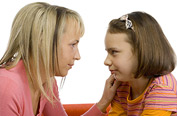YOU ARE HERE: Home
> Info for Parents > BiPolar/Schizophrenia
BiPolar/Schizophrenia

Joe’s Story
Joe is a sixteen year old boy in Transition year. Joe has always appeared to be slightly on the edge of his peer group. However, recently he seems to be actively avoiding his classmates. On two occasions he has approached teachers with vague allegations that two students had ‘sent messages around about him’. When questioned, Joe was unclear as to how this had happened. A times Joe appears completely absorbed by this own thoughts and is very difficult to engage in class work. At other times Joe appears agitated. When Joe does talk, he appears to lose the train of his thought and can be difficult to follow…..
What is Schizophrenia?
Schizophrenia is a serious mental illness, which affects many aspects of how a person thinks and perceives the world around them. Schizophrenia can cause people to develop delusional beliefs and hallucinations. Delusions are unshakeable beliefs which are frequently bizarre and which are held with total conviction. Hallucinations occur when a person experiences a sensory stimulus, which they perceive as real but which has not actually occurred. For example, auditory hallucinations occur when the person has the experience of hearing a voice or voices when in fact nobody has spoken. Visual hallucinations occur when the person sees something which is not there in reality. The experience how ever, is totally ‘real’ to the person. Schizophrenia also impacts on a person’s ability to establish and maintain friendships and to remain in school or employment.
What signs should I look out for?
Increasingly it has been recognised that prior to the onset of a full-blown psychotic episode, the young person has typically been struggling for a considerable period. Furthermore it has been established that the average delay between onset of symptoms and effective treatment is almost 2 years. This places teachers in a very special position of being able to identify early signs and to bring these to the parents’ attention.
The following symptoms may occur:
- Significant fall-off in concentration;
- Deterioration in school-performance;
- Difficulties getting normal daily activities done;
- Free-time noticeably less productive; Preference to spending free time alone; Noticeable change in self-care;
- Noticeable increase in suspiciousness and becoming mistrustful of other people;
- Taking a particular special and self-referential meaning out of ordinary events;
- Appearing increasingly absorbed by own thoughts;
- Appearing increasingly confused by own thinking;
- Describing hearing unusual sounds or voices;
- Talking about wanting to self-harm or end life;
- Talking about harming someone else.
.
Is Schizophrenia a serious condition?
Schizophrenia is a very serious illness that can affect all areas of a young person’s life. The earlier Schizophrenia is recognised and treated the better the outcome. A young person who receives early treatment is less likely to require hospital admission and is more likely to go on to live and work independently. Overall, 20% of people with Schizophrenia will get better within five years of their first episode of illness; 60% will get better but will have relapses and 20% will have persistent symptoms.
Suicide is more common in people with Schizophrenia than in the rest of the population. The period of greatest risk is in the first year after diagnosis. The risk is increased when the person has active psychotic symptoms, has become depressed, is not receiving treatment or when the person has made a previous suicide attempt.
How common is Schizophrenia?
Schizophrenia affects approximately 1% of the population, a prevalence equal to that of diabetes. It is equally common in males and females. It is uncommon to develop schizophrenia under age 15. The peak incidence occurs between age 15 and 35. Schizophrenia has recently reported to be more common in immigrant populations and in people who have grown up in cities and large towns.
What causes Schizophrenia?
The definite cause of Schizophrenia is unknown. The research to date suggests that it is most likely to be a mixture of different factors such as genetic, biological, social factors and stress. The role that each of these factors plays in the development of the illness
for each individual will vary.
Genetic Factors
Genetic factors are known to be important in Schizophrenia. Genes have been shown to account for between 50% and 70% of the risk of developing Schizophrenia. A person with no biological relative with Schizophrenia has a 1 in 100 chance of developing the illness. This risk increases to 1 in 10 for those with one parent with Schizophrenia. For those with an identical twin with the illness, the risk rises to one in two whereas the risk is considerably lower at one in eighty if the twins are non-identical. Given that identical twins share the exact same genetic make-up, this finding suggests a significant role for genes in the development of Schizophrenia. These differences remain consistent, even in twins that are adopted and reared in different families, adding weight to the theory that it is the genes and not the environment (home life) which makes the significant difference. The genes responsible for Schizophrenia have not been established.
Biological Factors
The neurodevelopmental hypothesis
This theory attempts to link together a number of different research findings on the development of Schizophrenia. It is more common for people with Schizophrenia to have had a viral illness early in their foetal development. It has also been found that babies who experience difficulties at birth resulting in lack of oxygen to the brain have an increased risk of developing Schizophrenia. In addition, brain scans of people with Schizophrenia show that compared to the rest of the population, there are differences in their brains. These studies have established that people with Schizophrenia have higher levels of structural brain abnormalities. Together these findings suggest a link between damage to the developing brain and development of Schizophrenia in later life.
The use of drugs
The role of specific street-drugs in the development of Schizophrenia has become a topic of increasing interest in recent years. Research suggests that use of cannabis increases the risk of developing Schizophrenia by 50%. It is important to note that the active drug content in the marijuana which is available today is very significantly higher than in previous decades. Therefore, it is not possible to draw conclusions as to the long-term mental health effects of cannabis by looking at people that used the drug in past decades. The use of cannabis is more likely to lead to Schizophrenia if the person started using it as a young teenager. The association between cannabis use and development of Schizophrenia is particularly strong for people who have used cannabis more than 50 times: they are 6 times more likely to develop Schizophrenia.
The role of other drugs such as LSD and amphetamines is less clear. For example, it is known that amphetamines can produce transient psychotic states but it is not known if they increase the risk of enduring psychotic symptoms and Schizophrenia. At times, people who are developing schizophrenia and who have not received any treatment may use dr ugs and alcohol as a form of self-medication in an attempt to help them deal with distressing symptoms. This may lead to dependence on these substances which makes effective treatment of the illness much more difficult.
Family Factors
Early theories of Schizophrenia emphasised the role of families in its development. Specific styles of communication including a tendency for parents to be inconsistent in the messages they gave their children were thought to be particularly important. It has now been concluded that there is no evidence to support these ideas. However, it is known that living in an environment where there is expression of high levels of discord (high expressed emotion) within the family leads to a less favourable outcome and increases the likelihood of relapse.
Childhood Deprivation
Children who experience early deprivation or abuse are at increased risk of developing Schi zophreni a. Recent research in the Netherlands has demonstrated an increased rate of psychotic illnesses in children who have been abused which has led to increased emphasis on the role of psychosocial factors in the development of these illnesses.
When is professional help needed?
Schizophrenia can have very serious negative consequences for young people in all aspects of their life. When concerns arise that a young person may be developing this illness, assessment by a psychiatrist is required as soon as possible. The GP makes an initial assessment of the child and then refers to CAMHS for a comprehensive psychiatric evaluation.
Treatment
The overall aim of treatment is to reduce psychotic symptoms and to help rehabilitate the person to allow them to reintegrate insofar as is possible to the life led prior to becoming unwell. Treatment may be started in a variety of settings such as in an outpatient department or in hospital depending on how unwell the young person is and taking into account personal and parental views. When a young person is very unwell with psychotic symptoms, inpatient admission may be required to allow more rapid treatment. Medication is the cornerstone of treatment in Schizophrenia. The aim is to use medication to decrease the psychotic symptoms over a number of weeks and to help the young person think more clearly again. Ultimately, the goal is to enable the young person to return to as near as possible to their previous level of functioning.
What are the side-effects of medication?
The most commonly prescribed medications for Schizophrenia are called ‘atypical’ or ‘second-generation’ anti-psychotics to distinguish them from the original ‘first-generation’ anti-psychotics that were discovered in the 1950s. Unfortunately, as with all medication, there are a number of potential side-effects including:
- Drowsiness;
- Increased appetite;
- Weight gain;
- Increased risk of Diabetes;
- Muscle stiffness and shaking in the hands.
Medications are typically started at the lowest possible dose to control symptoms and increased gradually as required to limit the likelihood of side-effects. The young person and parents are made aware of side-effects at the outset. It is important that the young person is aware of the possibility of weight gain. Both the young person and parents are encouraged to pay attention to dietary intake. The need for regular exercise is highlighted as a priority. Blood tests may be taken prior to the start of medication and will be monitored regularly. The effectiveness of the medication in reducing psychotic symptoms is closely assessed. The medication may be increased or switched to a different medication if it does not control symptoms adequately.
How important is medication?
Medication is a core element of treatment. It does not however ‘cure’ the illness but does play a significant role in helping to keep symptoms at bay. Approximately 80% of people with Schizophrenia who are treated with antipsychotics will experience a reduction in symptoms. Despite this, symptoms may recur even when taking medication. However, the young person is much less likely to have a relapse when taking medication than if medication is stopped prematurely.
Young people are generally advised to take medication for at least one year following a first psychotic episode. Adherence to medication is often very difficult for young people. It is very important that they are supported in this, as stopping medication significantly increases the risk of relapse, usually within the first six months.
Cognitive-Behavioural Therapy (CBT)
CBT has been shown to be helpful for people with Schizophrenia. The person is helped to first identify unhelpful thoughts and behaviours commonly through use of a ‘thought record’ and ‘behaviour diary’. The individual is supported to increase the range of ‘healthy’ behaviours engaged in, such as exercising, meeting friends or listening to music. The individual is helped to develop a repertoire of alternative more constructive reactions to delusional thoughts and hallucinatory experiences. This can help the individual to develop more control over reactions to psychotic symptoms which in turn
lessen the distress associated with these experiences.
Family Work
It is very important that the families of young people with Schizophrenia receive support. A recent study in Dublin has found that involvement in a Family Education Programme can decrease the risk of relapse four-fold. The aim of working with families is to help them to develop a better understanding of their child’s illness and how it is treated. For example, parents may find it very useful to focus on early signs of relapse specific to their child, so that they can seek help at the earliest sign of relapse.
Parents often struggle with feelings of guilt after their children are diagnosed, perhaps blaming themselves for their child’s illness. It is very important that parents are given the opportunity to address these worries and receive reassurance that families do not cause Schizophrenia. The focus of family work is usually on practical issues that arise for a family after diagnosis. The aim is to try to provide support for the family and decrease stress.
Support Groups
Books for children / youths
- “Matt the Moody Hermit Crab” by Caroline McGee. For ages 8-12. Soulwave Publishing 2002.
- Brandon and the Bipolar Bear” by Tracy Anglada. For ages 4-11
- My Bipolar Roller Coaster Feelings Book” by Bryna Hebert. Published by Childtherapytoys.com, 2004. Also a workbook that can accompany this book.
- Everything you need to know about bipolar disorder and manic-depressive illness” by Michael A. Sommers. For teens. The Rosen Publishing Group,2003.
Books for parents
- Survival Strategies for parenting children with Bipolar Disorder” by George Lynn, Jessica Kingsley Publishing, 2000
- “The Bipolar Disorder Survival Guide: What You and Your Family Need to Know” by David J Miklowitz. Guilford Press, 2002
- “The Bipolar Child: The Definitive and Reassuring Guide to Childhood’s most misunderstood Disorder” by Janice Papolos. Broadway Books, 2006
- “What Works for Bipolar Kids: Help and Hope for Parents” by Mani Pavuluri. Guilford Press, 2008









